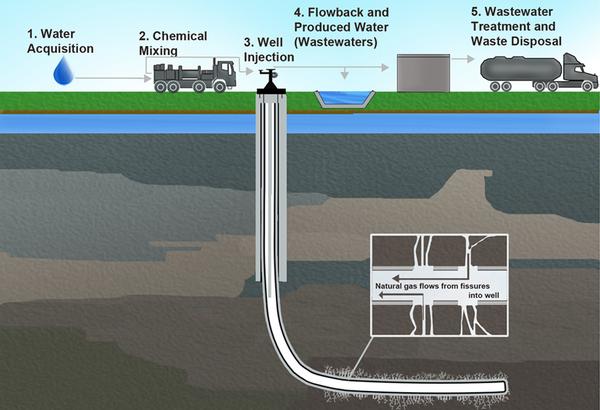
Photo by: EPA
A diagram created by the EPA illustrates the role of water in the hydraulic fracturing (or “fracking”) process.
Thirteen Bronx politicians in the state Assembly and Senate received funds from pro-fracking organizations ranging from $250 to $54,495, according to a >Common Cause report issued over the summer. Common Cause, a nonprofit advocacy organization, analyzed campaign contributions from donors it deemed support fracking.
“Common Cause/NY’s analysis broadly defines ‘pro-fracking interests’ as the full spectrum of industries involved in natural gas production rather than only the drillers,’ the report said. “In New York, the largest campaign contributors involved in the business of fracking are the supporting industries like engineering firms, pipeline owners, chemical companies, construction industry organizations and unions, law firms with oil and gas practices and other affiliated members of pro-fracking organizations such as IOGA and Clean Growth Now.”
Leading the list of Bronx supporters of those types of companies was State Senator Jeffrey Klein who received $54,495. However, Eric Soufer, Klein’s spokesman, adamantly disputed the report. He disagrees with the organizations that Common Cause designated as pro-fracking and said Klein is an outspoken opponent of fracking.
“Does anyone actually believe that hydrofracking is a top priority for the New York State plumbers and steamfitters union?” he asked. “Or that the trucking association is more concerned about oil and gas exploration than highway taxes? Of course not, but this report is riddled with examples just like that.”
The Common Cause report says that the organization “recognizes that because we take a broad view of pro-fracking interests some contributions included in this dataset, such as those from major business lobbies like the Business Council of NYS, may be related to other issues. However, this data taken as a whole provides an accurate measure of the power and influence of pro-fracking business interests in state and local government.”
Soufer, however, said, “Senator Klein supports the moratorium bill and has never met with any of these groups, or their representatives, on this topic. We are currently acting under a moratorium in New York State, and unless the governor decides to move ahead with fracking, this moratorium will continue.”
Assemblyman Jeffrey Dinowitz and State Senator Gustavo Rivera, who received relatively small donations from those companies ($1,250 and $500 respectively), also strongly disagreed with the report. They both said they are outspoken opponents of fracking.
Both Dinowitz and Rivera are in favor of changing the campaign finance system to a public finance system, which they say, will avoid special interest issues. Fair Elections for New York worked with Common Cause on the report and have been advocating for cleaner elections for years.
Assemblymembers Mark Gjonaj and Luis Sepulveda were the only two Bronx state pols not named in the report.
Gjonaj, however, is undecided on whether the state should pursue fracking.
“We come from a borough with the highest unemployment rate in the Bronx,” he said. “Hydrofracking can create some great jobs.”
Yet, Gjonaj is concerned about the health risks associated with the practice, and therefore is waiting until more research is done before voicing his opinion.
All donations to Bronx, and citywide, elected officials referred to by Common Cause can be found in
Common Cause’s report.








